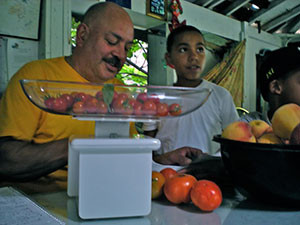New Data Collection Toolkit Allows Urban Farmers to Measure Progress
January 5, 2016 | Anne Craig
Urban farmers and gardeners now have a brand new way to measure their results and gather hard data thanks to the Farming Concrete Data Collection Tool Kit.
The project originated in New York City in 2009 as a collaborative venture between nonprofits Added Value Farms and the Design Trust for Public Space. The data collection tools are intended to help individual farmers quantify what they are doing in ways that will help them both improve and promote their farms.
The toolkit includes 16 protocols organized into five categories: food production data, environmental data, social data, health data, and economic data. Online forms allow farmers to upload raw data for each protocol and create reports as needed. So far, the data includes contributions from 285 urban farms and community gardens in 43 cities, and records the harvest of over 75,000 pounds of food and 4,000 pounds of compost.
The data on the website is available to any and all interested parties.
“We can aggregate all these numbers—and we do, in some instances, with simple measures like pounds of food grown or pounds of compost produced,” says Design Trust Fellow Phillip Silva. “But impacts should be paired with objectives. And not all gardens aim to accomplish the same things. We try to let each one stand on its own merits.”
“The Toolkit is much more than just an alternative to old fashioned log books,” says project director Mara Gittleman. “It’s a collection of methods for collecting data not just about the number of pounds of vegetables harvested, but about harder-to-measure outcomes like the number of children who changed their minds about liking the taste of a garden-grown vegetable or the number of good moods a garden creates for all the people that walk through the gate.”
There’s a manual and a set of instructional videos to get new folks up to speed, and the entire package is free. “Our main priority is giving individual gardens the tools and methods to collect data on what does and doesn’t work in their practices from season to season, to track their successes and failures and give them an easy way to share what they discover with funders, policymakers, and other gardeners,” says Silva. “Every garden has its goals and objectives. Some purposefully try to grow as much food as they can. Others barely grow any food at all and focus on providing their neighbors with a pocket of open space.”
“The Toolkit gives gardeners and farmers a step-by-step set of instructions for collecting the data that matters most to them in any given season,” says Gittleman. “Users can keep track of all that data on paper worksheets included in the Toolkit or log it directly into Barn, the special data repository at our website. From there they can generate clean and crisp reports to share with other gardeners, funders, or policymakers.”
The collaboration has already produced two books analyzing the data and offering policy recommendations: Five Borough Farm: Seeding the Future of Urban Agriculture and Five Borough Farm II: Growing the Benefits of Urban Agriculture in New York City.
“Farmers who make a living from their work are always collecting data on what works—and what doesn’t work—in their practices,” says Silva. “Which varieties and cultivars do well on the farm? Which sell out at the market and which rot in the field? Which do well in the local climate? Community gardeners and urban farmers are really no different. They need insight into their successes and failures as they work to meet their goals from season to season. The one big difference involves the breadth and diversity of goals and objectives you’ll see at an urban farm or community garden. For most of these initiatives, growing food is just the beginning of a long list of outcomes that benefit the community, from creating vibrant green space to serving as local laboratories for direct and participatory democracy.”
This article originally appeared on Seedstock.com: http://seedstock.com/2015/12/10/new-data-toolkit-allows-urban-farmers-to-measure-progress/












Submit a Comment